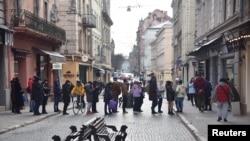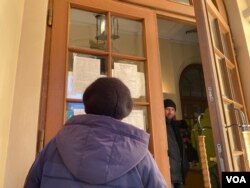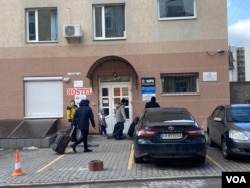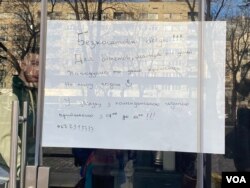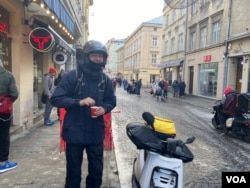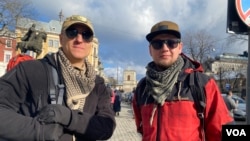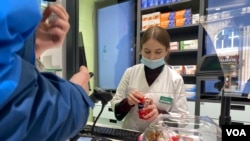At first glance Lviv seems like a normal Central European city with some bustle in the streets.
In its central square the yellow trams still trundle along much as they have since 1894 with interruptions in the service only during the First and Second World wars; and there are even some sightseers walking around to inspect the town’s historic buildings.
But take a closer look and the sightseers are not genuine tourists but evacuees from other parts of Ukraine waiting to join the huge exodus heading to Poland and overwhelming the border posts. Or they are just wiling away time because they’re stuck in Lviv, unable to leave because among their group are men aged over 18 and younger than 60 years old, who are forbidden to leave the country as they might be enlisted to fight.
Lviv is a city increasingly on edge, especially in the wake of news that Belarusian leader Alexander Lukashenko is expected to throw in his 48,000-strong army into the war raging in Ukraine in the next few hours or days to reinforce Russia with its sputtering invasion of Ukraine.
If Belarus does enter the war full blast the fear is a new front might open in northwest Ukraine involving Lviv, whose outskirts are flooding with evacuees and where there is a 40-kilometer line of cars waiting to enter Poland. And Lviv residents watch with rising anxiety and anger what they are seeing happening to Kyiv and Kharkiv, Ukraine’s second largest city where on Monday vicious Grad rocket attacks struck residential districts leaving around a dozen civilians dead and many injured.
They fear the same will happen to their city, if the war continues, and they are preparing for the war to impact them much more directly than what they are already experiencing in the form of an ever-engorging flood of evacuees on the outskirts. But they are also angered by the missiles and rockets raining down on the cities east of them, noting that the targeting of civilian infrastructure and residential quarters has come in spite of Russian leader Vladimir Putin reportedly telling French President Emmanuel Macron this week that he was “willing to commit” to ending attacks on civil infrastructure while peace talks in Belarus were under way.
Like many Ukrainians, they fear Putin’s choice now is between “negotiation or Grozny,” a reference to the near destruction of the Chechen capital in late 1999 to early 2000 when Putin was prime minister and in the process of succeeding Boris Yeltsin as Russia’s president.
Preparing to fight
The steadfastness and tenacity of the defense of Kyiv and Kharkiv inspires people here in Lviv, a city that has been no stranger to wars through the centuries. “Our fighters are hungry,” Yury, a waiter, tells me. “They have a lot of combat experience from years of fighting in the Donbas and they now want revenge and to finish off the Russians,” he adds.
“I don’t think Putin realized what he was taken on and how we would resist,” he says.
Air-raid sirens sound off here three or four times a day and whereas most people a few days ago did not take the sirens seriously now they do, with most stopping what they are doing and heading for any nearby bunker, or they seek the best improvised shelter they can find. One hotel owner has now started requiring his guests to head to the bunker and not loiter in the entrance. “It is good practice for them to get into the habit of getting to the bunker,” says Mykola, a heavy-set 55-year-old who only opened his hotel in October.
Others are preparing in other ways. Lviv’s Pravda (Truth) Brewery has appealed on social media for donations to help make a variety of different sizes of Molotov Cocktails.
The owners say they made the cocktails for the 2014 Maidan uprising, which toppled Putin ally Viktor Yanukovych from power. Taras Maselko, PR director of Pravda's holding company, says people are scared but resolute. “No one wants war, but we are getting ready to defend ourselves,” he says. “We're doing everything we can to prepare,” he adds. He says it is hard to witness the plight of the evacuees flooding the roads around the city.
More of them appear hourly now in the city center pulling their wheelies and struggling to carry bulging backpacks. They are coming into the city center to see if they can find accommodation or are heading to the besieged railway station to see if they can secure a place on one of the packed free trains heading to Poland. Foreigners are finding it even harder to secure a ride on the trains, with authorities here prioritizing Ukrainians.
Few shops are open other than food stores and pharmacies are open — the town’s biggest shopping mall has been closed for days. And 80% of the restaurants are shuttered. Bar BQ is not one of them. A big message plastered to the window explains the restaurant will give free meals to any evacuees and they can also rest inside for a few hours.
“We are all people, and we understand how they must be feeling,” says Maria, the 28-year-old manager. “Maybe they have no money for food, and we are giving them shelter because, well it is what we should do.” She says the people who drop by come from all over — from Kharkiv, Donetsk and Kyiv. Supplies are becoming a challenge. “We get help from other restaurants and stores,” she says.
Nearby in the historic heart of the center 22-year-old Marian is grabbing a coffee with three of his friends.
They work for the food and meal delivery company Glovo, whose insulated yellow bags are ubiquitous in Ukrainian cities. "Most of the expensive restaurants have closed,” he says. “The fast food and kebab ones are still open,” he adds cheerily. Any profit Glovo makes delivering meals is sent to help support Ukraine’s military, Marian tells me.
Will he go off to fight? He says he will when called up. Others aren’t waiting for the call. Two backpacking veterans from the fighting in 2015 in eastern Ukraine, where armed pro-Russian proxies with Kremlin backing seized parts of the Donbas, are on their way east pushing against the torrent of refugees to Kyiv.
Among them are Oleksandr, aged 34, and 42-year-old Ihor. “We have not been called up because there are no places and so we go as volunteers and there are a lot who want to fight against the Russian invasion,” Oleksandr, an IT worker, says.
“This is our homeland,” says Ihor. “To ask us why we want to fight is a silly question. This is our homeland. We must fight. We have to fight. That is it. My girlfriend isn’t happy I am going but she understands why I must,” he adds.
As Lviv prepares itself for what it worries will soon visit it, the food stores and pharmacies are starting to report they are running low on stocks. One pharmacist says she has no bandages and is running very low on antibiotics. Another has no painkillers of any description or strength.
In one supermarket they have no bread. Another is running short of fruit.
Hotels are still offering meals, but many just have one evening dish with no other options. Under orders of the city mayor no alcohol can be sold by stores or offered by hotels or restaurants in the evening or nighttime. The authorities say the ban is necessary to try to stop a rise in alcohol-fueled antisocial behavior.
There are also worries about alcohol affecting the judgment of nervous armed volunteers who are starting to appear in outlying villages.




